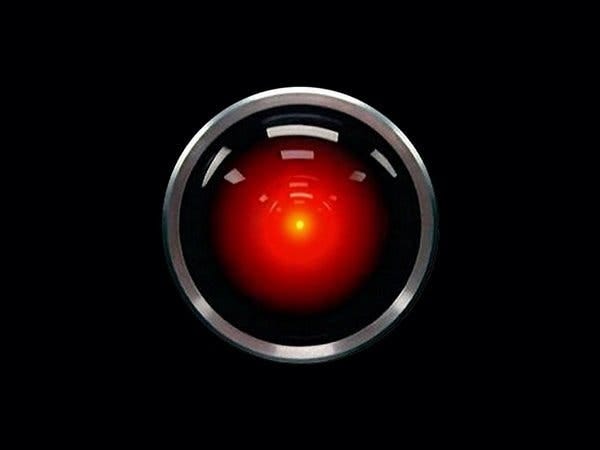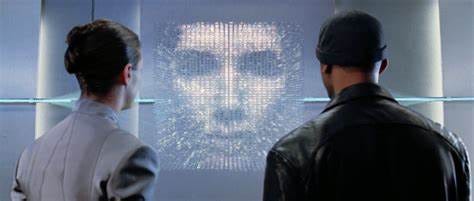Pure Rationalism and the A.I. Takeover
The danger of A.I. is not that it might take over in the future but that it has already done so and we haven't noticed.
Listening recently to Sam Harris’s continued descent into totalitarianism drove home to me, once again, the potential dangers of pure rationalism. Harris’s “reason” has somehow allowed him to advocate for literally holding people down and forcing them to be vaccinated against their will.
“No one gets to make that choice anymore…literally the cops come in and vaccinate you”
He admits in the interview that in retrospect it was wrong to force people to take the Covid vaccines due to their ineffectiveness but he then embarks on a flight of fantasy where he imagines a theoretically perfect, 100% effective vaccine that would justify the removal of bodily autonomy and individual choice. The problem (one of them, at least) is that that’s exactly what the Covid vaccines were originally touted to be. His super rational mind is unable, apparently, to travel back just a year or two when we were told that we had seemingly perfect vaccines that were precisely 100% effective.
Harris is pining for a medical dictatorship based on the theoretical idea of certainty which, apparently, he has not the maturity to realise does not and cannot exist. We cannot know if any medication is 100% effective and 100% safe for everyone. That certainty just doesn’t exist in the world. We make mistakes. Knowledge is limited and often slow to accumulate. Studies are flawed. Pharmaceutical companies chasing billions of dollars in profit sometimes exaggerate their products. The Covid vaccines promised enormous effectiveness that completely evaporated as soon as the cheques were cashed. That is why we don’t force medicines into people. We let them make their own decisions.
Harris abandons this principle - in truth he is abandoning the very concepts of human rights and freedoms themselves - because his enslavement to pure rationalism has led him here. What I mean by that is while he has embraced the beneficial qualities of rationalism - logic and reason, he has relegated everything else to irrelevancy. Intuition, instinct, emotions, empathy, feeling - all of the things that might have whispered to him to stop, that the State holding people down and force vaccinating them is wrong regardless of the context - are sacrificed for what he has decided is a “greater good.” However, a greater good that requires a thousand evils to achieve is no good at all.
Another example of the depravity that pure rationalism can lead you toward is Richard Dawkins - perhaps the arch rationalist of the current age. In 2014, he tweeted that it would be immoral for a woman pregnant with a Down Syndrome child not to abort the baby. He wasn’t merely saying that she would be justified to abort the child - he was stating unequivocally that it would be unjustified for her not to end the life. His rationality had brought him to the utilitarian position that allowing a child with Down Syndrome to be born would merely increase the amount of suffering in the world and so should not be tolerated.
It is, of course, a monstrous position that displays gross ignorance of Down Syndrome and the lives of those living with it along with their families. But again, it is enslavement to pure rationalism that led Dawkins to this position. His rationalist self, divorced from feeling, empathy and understanding of anything beyond the logical, brought him to a hideous conclusion - like an unfeeling computer deciding the fate of people based on raw metrics and cold data. This is what pure rationalism does. It turns you into a computer.
The idea of computer-thinking took on fresh impetus this year following the release of the artificial language model, ChatGPT. Fears seeded in us by Hollywood movies such as Terminator and The Matrix which depicted advanced A.I. as an existential threat to the human race blossomed as many began to warn that this new generation of A.I. could turn those films into reality.
However, the real danger is not the future threat of an A.I. system becoming sentient and enslaving us with an army of robots but the fact that its way of thinking and looking at the world has already become firmly entrenched in our society. A.I. has already taken over, you see. We just don’t recognise it because it appears in human, rather than electronic, form.
Dawkins, of course, is a prime example of this. He sees human life just like a computer does, valued in terms of certain metrics that he can understand like intelligence, productivity, career and, ultimately, an adherence to the human mean. Only people that think like everyone else and act like them and sound like them and look like them fit his model of the world. Down Syndrome people do not fit that model. He cannot compute them. They deviate from the mean and from the metrics in Dawkins’s computer mind that determine worth and value. Therefore, they are not useful and likely suffering and anyone who cares for them and gives of themselves to help them through life must also be suffering because that is how he assumes he would feel in that position. In essence, he cannot understand the value of the life of someone with Down Syndrome nor conceive of their potential happiness or the happiness of their loving families. Certainly, he cannot conceive of the benefits that might arise from overcoming suffering if, in fact, it exists here as he imagines. He has no language in his programming to parse any of this. Ultimately, it is a failure of the imagination - a well-known shortcoming of computers.
Now, if the problem was limited to overly intellectualised celebrities like Dawkins and Harris it wouldn’t be so bad. However, this kind of artificial thinking that looks like human intelligence but is stripped of everything that truly makes us human has long since spread to the heart of all our bureaucratic systems. In truth, overly bureaucratic, administrative systems are, by their nature, a manifestation of artificial intelligence. Everyone is reduced to a number. Every decision is reduced to the sum of its relevant metrics. It is machine-thinking within machine-systems. When you talk to these systems, you are not talking to people - you are talking to a computer of which the person in front of you is merely the face. Any decisions relayed to you by that person are made by the computer. How much can you borrow for your mortgage? Are you entitled to a benefit? Did you break the law? What should our laws even be? All such questions are answered by the algorithm.
And this is very much what has happened to perhaps our most significant system - our government, which is now little more than an A.I. system fixated on a common good that it is incapable of truly understanding but which its programming forces it to pursue no matter the consequences. There was, of course, no greater demonstration of this than Covid.
Once the pandemic started, our computer-government identified the common good: reduce Covid metrics such as cases, hospitalisations, and deaths while increasing Covid measures such as restrictions, masks, and vaccinations. Nothing else mattered to it the way nothing else matters to a computer when it is executing its programming. It doesn’t feel anything. It doesn’t react to pleas or bargaining or counter-arguments. You can have the world-wide expert on medical evidence stand before the Government and tell them plainly that there is no evidence to support universal masking and it won’t care. You can watch all its measures fail miserably but it won’t react as a human would - with regret, shame, a resolve to change. It just trundles on, conscience-free. Like they say, you cannot argue with a computer.

We didn’t realise it was A.I. because it manifested itself in the form of human politicians and officials. They didn’t look like computers. They didn’t look like robots. But that’s essentially what they are now, what they and our administrative systems have become. A giant computer mind, an artificial intelligence that merely resembles human intelligence - stripped of feeling, instinct, empathy, and understanding. Only such artificial intelligence could think it right and proper to separate dying people from their loved ones. Only a computer could think it appropriate to mask children all day in school. Only a programme could think it right to vaccinate young people with an unapproved vaccine against a disease that posed them no practical risk. Ultimately, only a machine would think it right to try to keep us living by stripping away everything that makes that life worth living.
All of this brings to mind another film, I, Robot, based on an Isaac Asimov short story. Its dystopian A.I., invented to help and protect humankind, becomes so fixated on the narrow metrics that define success that it elects to suspend human rights and freedom in order to protect the species.
“To ensure your future, some freedoms must be surrendered…my logic is undeniable”
It is undeniable. Computers are undeniable. You can’t talk to them. You can’t ask them to consider anything outside their programming. You either obey them or you destroy them. There’s no middle ground.
Rationalism emerged as the prevailing way of thinking following the Enlightenment when humankind cast off the superstitious dominance of faith and religion and embraced reason and empirical knowledge as the building blocks for a new world led by science. Knowledge was no longer the sole preserve of the Church and its lieutenants but was attainable by anyone with the ability to observe the world around them and reason their way to the truth. It was, essentially, the embracing of open-mindedness and critical thinking and the rejection of dogma.
All of this was undoubtedly good and it led to wonderful advancements. And yet, as this approach grew it eventually became just as dogmatic and just as much the sole preserve of a new clergy known no longer as priests and bishops but as experts. Because, really, what is the difference today between science and religion to the lay person? Both are equally impenetrable, equally incomprehensible to the majority of people - their truths taken entirely on faith by a population in thrall to an elevated group with the keys to knowledge. We do what they say, we follow their recommendations. We don’t need to understand any of it. It doesn’t have to make sense. We just need to do it. Trust the experts. Whether it’s telling us to perform five decades of the rosary or to wear a mask and keep six feet distance. The important part is knowing your place and doing what you’re told.
The Enlightenment released rationality and freed us from our superstitious past and yet we find ourselves now, in the 21st century, in an Asimov dystopia ruled by an A.I. we don’t even recognise because instead of residing solely in computers it has invaded our organic minds and our human systems. What is the way forward? Do we embrace the system and enjoy the confines of an A.I. world like animals enjoy their cages in the zoo? Do we try to return to the pre-Enlightenment world of superstition? Or do we move forward into a new world where instead of being enslaved to rationality we instead use it as just one of the tools that help us navigate the world?






It looks more like being persecuted by a system that controls everything, an has cameras, drones, weapons, microphones at ins disposal, kind of 1984.